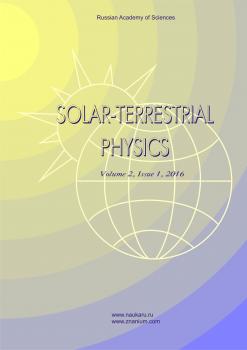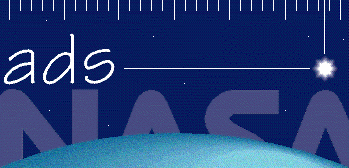Иркутск, Россия
Иркутск, Россия
Иркутский государственный университет
Иркутск, Россия
Иркутский государственный университет
Иркутск, Россия
Иркутск, Россия
We study the level of total electron content (TEC) disturbance in ionospheric mid-latitude and high-latitude regions, which occurred during 2013. TEC behavior is calculated using data from two GPS stations: MOND (Mondy) and NRIL (Norilsk). TEC variations are estimated from dual-frequency phase measurements for all radio signal paths. We analyze the TEC variations in two time ranges: 10 and 40 min. These ranges correspond to medium- and large-scale ionospheric disturbances respectively. The TEC disturbance level is characterized using a special index WTEC. It allows us to receive multi-day continuous series of average TEC variation intensity. We reveal that at high latitudes WTEC variations correlate well with AE ones. The correlation between WTEC and Dst variations is much lower. The minimum level of TEC disturbance is independent of the season in the Arctic region; diurnal WTEC variations are more pronounced for medium-scale ionospheric disturbances than for large-scale ones. At mid-latitudes, the WTEC variation concurs with Dst and Kp variations only during strong magnetic storms. The minimum level of TEC disturbance is higher in summer than in winter. At middle latitudes, the sunset terminator generates gravity waves. In the Arctic region, terminator-induced waves are not observed.
GPS, ionosphere, total electron content, Arctic region, geomagnetic variations
1. Afrajmovich E.L., Perevalova N.P. GPS-Monitoring Verkhnej Atmosfery Zemli [GPS-Monitoring of the Earth´s Upper Atmosphere]. Irkutsk, SC RRS SB RAMS. 2006, 480 p. (in Russian).
2. Afraimovich E.L., Edemsky I.K., Voeykov S.V., Yasuke-vich Yu.V., Zhivet´ev I.V. Spatio-temporal structure of the wave packets generated by the solar terminator. Adv. Space Res. 2009, vol. 44, no. 7, pp. 824-835.
3. Berngardt O.I., Voeykov S.V., Ratovsky K.G. Using a single GSP/GLONASS receiver for estimating the level of ionospheric disturbance. General Assembly and Scientific Symposium (URSI GASS), 2014 XXXIth URSI, 16-23 Aug. 2014. IEEE. 2014a, pp.1-3. DOI:https://doi.org/10.1109/URSIGASS.2014. 6929809.
4. Berngardt O.I., Voeykov S.V., Ratovsky K.G. Using a single GPS/GLONASS receiver for estimating the level of ionospheric disturbance. The 40th COSPAR Scientific Assembly. Moscow, Russia, August 2-10, 2014: abstracts. M., 2014b, P. C0.2-0015-14.
5. Hocke K., Schlegel K. A review of atmospheric gravity waves and travelling ionospheric disturbances 1982-1995. Ann. Geophys. 1996, vol. 14, no. 5, pp. 917-940.
6. Hofmann-Wellenhof B., Lichtenegger H., Collins J. Global Positioning System: Theory and Practice. New York, Springer-Verlag Wien. 1992. 327 p.
7. Ishin A.B., Voeykov S.V., Perevalova N.P., Zalizovsky A.V., Sopin A.A. Ionospheric parameters´ variations registered during powerful hurricanes near the USA Atlantic coast in 2005. Sovremennye problemy distantsionnogo zondirovaniya Zemli iz kosmosa [Present Problems of Remote Probing Earth From Space]. 2009. vol. 6, no. 2. pp. 274-279 (in Russian).
8. Kotake N., Otsuka Y., Tsugawa T., Ogawa T., Saito A. Climatological study of GPS total electron content variations caused by medium-scale traveling ionospheric disturbances. J. Geophys. Res. 2006, vol. 111, A04306. DOI:https://doi.org/10.1029/2005 JA011418.
9. Otsuka Y., Kotake N., Shiokawa K., Ogawa T., Tsugawa T., Saito A. Statistical study of medium-scale traveling ionospheric disturbances observed with a GPS receiver network in Japan. Aeronomy of the Earth’s Atmosphere and Ionosphere, IAGA Special Sopron Book Series 2. 2011. no. 21, pp. 291-299. DOI:https://doi.org/10.1007/978-94-007-0326-1_21.
10. Otsuka Y., Suzuki K., Nakagawa S., Nishioka M., Shiokawa K., Tsugawa T. GPS observations of medium-scale traveling ionospheric disturbances over Europe. Ann. Geophys. 2013, no. 31, pp. 163-172. DOI:https://doi.org/10.5194/angeo-31-163-2013.
11. Tsugawa T., Kotake N., Otsuka Y., Saito A. Medium-scale traveling ionospheric disturbances observed by GPS receiver network in Japan: a short review. GPS Solutions. 2007a, no. 11, pp. 139-144. DOI:https://doi.org/10.1007/s10291-006-0045-5.
12. Tsugawa T., Otsuka Y., Coster A. J., Saito A. Medium-scale traveling ionospheric disturbances detected with dense and wide TEC maps over North America. J. Geophys. Res. 2007b, vol. 34, L22101. DOI:https://doi.org/10.1029/2007GL031663.
13. Tsugawa T., Saito A. A statistical study of large-scale traveling ionospheric disturbances using the GPS network in Japan. J. Geophys. Res. 2004, vol. 109, A06302. DOI: 10.1029/ 2003JA010302.
14. Voeikov S.V., Berngardt O.I., Shestakov N.V. Using the index of disturbance of vertical TEC variations for studying ionospheric effects of the Chelyabinsk meteorite. Geomagnetizm i Ajeronomiya [Geomagnetism and Aeronomy]. 2016, no. 2 (Accepted) (in Russian).
15. URL: http://wdc.kugi.kyoto-u.ac.jp (accessed February 01, 2016).



















